| Listing 1 - 10 of 10 |
Sort by
|
Book
ISBN: 0520089154 Year: 1995 Volume: 34 Publisher: Berkeley ; Los Angeles ; London University of California Press
Abstract | Keywords | Export | Availability | Bookmark
 Loading...
Loading...Choose an application
- Reference Manager
- EndNote
- RefWorks (Direct export to RefWorks)
Bijzonderheid (Esthetiek) --- Particularity (Aesthetics) --- Particularité (Esthétique) --- Radicalism in literature --- Radicalisme dans la littérature --- Radicalisme in de literatuur --- English literature --- Literature and history --- Radicalism in literature. --- Renaissance --- History and criticism --- Theory, etc. --- History --- Particularity (Aesthetics). --- Early modern, 1500-1700 --- England --- 16th century --- 17th century
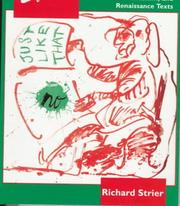
ISBN: 0520919211 0585261644 0520209052 9780520919211 9780585261645 9780520089150 0520089154 0520089154 Year: 1995 Publisher: Berkeley, CA : University of California Press,
Abstract | Keywords | Export | Availability | Bookmark
 Loading...
Loading...Choose an application
- Reference Manager
- EndNote
- RefWorks (Direct export to RefWorks)
Taking Wittgenstein's "Don't think, but look" as his motto, Richard Strier argues against the application of a priori schemes to Renaissance (and all) texts. He argues for the possibility and desirability of rigorously attentive but "pre-theoretical" reading. His approach privileges particularity and attempts to respect the "resistant structures" of texts. He opposes theories, critical and historical, that dictate in advance what texts must--or cannot--say or do. The first part of the book, "Against Schemes," demonstrates, in discussions of Rosemond Tuve, Stephen Greenblatt, and Stanley Fish among others, how both historicist and purely theoretical approaches can equally produce distortion of particulars. The second part, "Against Received Ideas," shows how a variety of texts (by Shakespeare, Donne, Herbert, and others) have been seen through the lenses of fixed, mainly conservative ideas in ways that have obscured their actual, surprising, and sometimes surprisingly radical content.
English literature --- Literature and history --- Littérature anglaise --- Littérature et histoire --- Particularity (Aesthetics). --- Particularité (Esthétique). --- Radicalism in literature. --- Radicalisme dans la littérature. --- Renaissance --- LITERARY CRITICISM / American / General. --- History and criticism --- Theory, etc --- Early modern, 1500-1700. --- Theory, etc. --- History --- 16th century --- England. --- 17th century --- Histoire et critique --- Théorie, etc --- 16e siècle. --- 17e siècle. --- Histoire --- 16e siècle --- Angleterre. --- 17e siècle --- Revival of letters --- Civilization --- History, Modern --- Civilization, Medieval --- Civilization, Modern --- Humanism --- Middle Ages --- Aesthetics --- Particularité (Esthétique) --- Particularity (Aesthetics)
Book
ISBN: 9781512823226 9781512823219 Year: 2023 Publisher: Philadelphia, Pa University of Pennsylvania Press
Abstract | Keywords | Export | Availability | Bookmark
 Loading...
Loading...Choose an application
- Reference Manager
- EndNote
- RefWorks (Direct export to RefWorks)
"This book shows Shakespeare confronting political, social, and philosophical issues: the motives of characters and ethical judgments on them; the defining features of legal systems; the problem of economic inequality; the limits and costs of power in colonial and other situations; the mind's capacity to know the world, other minds, and the supernatural"--
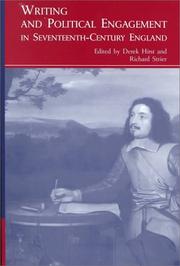
ISBN: 0521661757 0521100305 0511518935 0511825730 Year: 1999 Publisher: Cambridge New York Melbourne Cambridge University Press
Abstract | Keywords | Export | Availability | Bookmark
 Loading...
Loading...Choose an application
- Reference Manager
- EndNote
- RefWorks (Direct export to RefWorks)
This volume, first published in 2000, focuses on the relationship between writing and public concerns in seventeenth-century England before, during and after the civil wars and revolution of the mid-century. The distinguished list of contributors represent a variety of disciplines - political scientists, social and political historians and literary critics. They share an intense concern with the relationship between the act of writing and the political and public issues of this extraordinary period. The essays suggest that in the seventeenth-century the private and the public intersected so thoroughly that ostensibly 'private' writing was engaged with public issues and public rhetoric, while on the other hand, political writing was deeply involved with questions of style and inward conscience. This volume illuminates the complex issues of 'public' and 'private', 'art' and 'conscience' in the period.
Poetry --- English literature --- Drama --- anno 1600-1699 --- Early modern, 1500-1700 --- History and criticism --- Politics and literature --- Great Britain --- History --- 17th century --- Politics and government --- 1603-1714 --- England --- Intellectual life --- Authors [English ] --- Political and social views --- Arts and Humanities --- Literature --- Authors, English --- History and criticism. --- Political and social views. --- English authors
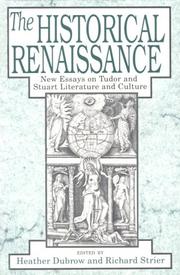
ISBN: 0226167666 0226167658 Year: 1988 Publisher: Chicago (Ill.) University of Chicago Press
Abstract | Keywords | Export | Availability | Bookmark
 Loading...
Loading...Choose an application
- Reference Manager
- EndNote
- RefWorks (Direct export to RefWorks)
820 "15/16" --- Engelse literatuur--?"15/16" --- English literature --- History in literature. --- Literature and history --- Literature and society --- Renaissance --- History and criticism. --- History --- 820 "15/16" Engelse literatuur--?"15/16" --- History in literature --- Literature --- Literature and sociology --- Society and literature --- Sociology and literature --- Sociolinguistics --- History and criticism --- Social aspects
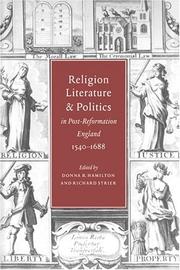
ISBN: 0511518927 0521474566 0521060877 Year: 1996 Publisher: Cambridge : Cambridge University Press,
Abstract | Keywords | Export | Availability | Bookmark
 Loading...
Loading...Choose an application
- Reference Manager
- EndNote
- RefWorks (Direct export to RefWorks)
This collection of essays by historians and literary scholars treats English history and culture from the Henrician Reformation to the Glorious Revolution as a single coherent period in which religion is a dominant element in political and cultural life. It seeks to explore the centrality of the religion-politics nexus for this whole period through examining a wide variety of literary and non-literary texts, from plays and poems to devotional treatises, political treatises and histories. It breaks down normal distinctions between Tudor and Stuart, pre- and post-Restoration periods to reveal a coherent (though not all serene and untroubled) post-Reformation culture struggling with major issues of belief, practice and authority.
English literature --- England --- Great Britain --- Church history --- History --- Arts and Humanities --- Literature
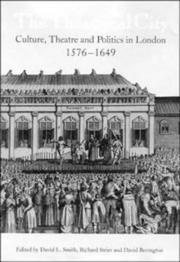
ISBN: 0521441269 Year: 1995 Publisher: Cambridge Cambridge University Press
Abstract | Keywords | Export | Availability | Bookmark
 Loading...
Loading...Choose an application
- Reference Manager
- EndNote
- RefWorks (Direct export to RefWorks)
English literature --- Drama --- anno 1600-1699 --- anno 1500-1599 --- English drama --- Literature and anthropology --- Politics and literature --- Theater --- History and criticism. --- History. --- History --- Political aspects --- London (England) --- Politics and government. --- Intellectual life. --- In literature. --- Civilization. --- History and criticism
Book
ISBN: 1283311356 9786613311351 0226777537 9780226777535 9781283311359 9780226777511 0226777510 Year: 2011 Publisher: Chicago ; London University of Chicago Press
Abstract | Keywords | Export | Availability | Bookmark
 Loading...
Loading...Choose an application
- Reference Manager
- EndNote
- RefWorks (Direct export to RefWorks)
Who during the Renaissance could have dissented from the values of reason and restraint, patience and humility, rejection of the worldly and the physical? These widely articulated values were part of the inherited Christian tradition and were reinforced by key elements in the Renaissance, especially the revival of Stoicism and Platonism. This book is devoted to those who did dissent from them. Richard Strier reveals that many long-recognized major texts did question the most traditional values and uncovers a Renaissance far more bumptious and affirmative than much recent scholarship has allowed. The Unrepentant Renaissance counters the prevalent view of the period as dominated by the regulation of bodies and passions, aiming to reclaim the Renaissance as an era happily churning with surprising, worldly, and self-assertive energies. Reviving the perspective of Jacob Burckhardt and Nietzsche, Strier provides fresh and uninhibited readings of texts by Petrarch, More, Shakespeare, Ignatius Loyola, Montaigne, Descartes, and Milton. Strier's lively argument will stir debate throughout the field of Renaissance studies.
European literature --- English literature --- History and criticism. --- Petrarca, Francesco, --- Shakespeare, William, --- Shakespeare, William --- Shakespear, William, --- Shakspeare, William, --- Šekʻspiri, Uiliam, --- Saixpēr, Gouilliam, --- Shakspere, William, --- Shikisbīr, Wilyam, --- Szekspir, Wiliam, --- Šekspyras, --- Shekspir, Vilʹi︠a︡m, --- Šekspir, Viljem, --- Tsikinya-chaka, --- Sha-shih-pi-ya, --- Shashibiya, --- Sheḳspir, Ṿilyam, --- Shaḳspir, Ṿilyam, --- Syeiksŭpʻio, --- Shekspir, V. --- Szekspir, William, --- Shakespeare, Guglielmo, --- Shake-speare, William, --- Sha-ō, --- Şekspir, --- Shekspir, Uiliam, --- Shekspir, U. --- Šekspir, Vilijam, --- Ṣēkspiyar, Viliyam, --- Shakspir, --- Shekspyr, Vyli︠e︡m, --- Şekspir, Velyam, --- Ṣēkspiyar, Villiyam, --- Shēkʻspʻiyr, Vlilliam, --- Ṣēkspiyar, --- Ṣēkspiyar Mahākavi, --- Ṣēkspiyar Mahākaviya, --- Sheḳspier, Ṿilyam, --- Shēkʻspir, --- Shakespeare, --- Śeksper, --- Шекспир, Вильям, --- Шекспир, Уильям, --- שייקספיר, וויליאם, --- שייקספיר, וו., --- שיקספיר, וויליאם --- שיקספיר, ויליאם --- שיקספיר, ויליאם, --- שכספיר, ויליאם, --- שכספיר, וילים, --- שכספיר, ו׳ --- שעפקספיר, וויליאם, --- שעקספיער, וויליאם --- שעקספיער, וויליאם, --- שעקספיער, ווילליאם --- שעקספיער, וו., --- שעקספיר --- שעקספיר, וו --- שעקספיר, וויליאם, --- שעקספיר, וויליאמ --- שעקספיר, ווילליאם --- שעקספיר, ווילליאם, --- שעקספיר, וו., --- שעקספיר, װיליאם, --- שעקספיר, װילליאם, --- שעקספיר, װ., --- שעקספער --- שעקספער, וויליאמ --- שקספיר --- שקספיר, וו --- שקספיר, וויליאם --- שקספיר, וויליאם, --- שקספיר, ווילים, --- שקספיר, וילאם --- שקספיר, ויליאם --- שקספיר, ויליאם, --- שקספיר, ויליים, --- שקספיר, וילים --- שקספיר, וילים, --- شاكسبير، وليم --- شاكسپير، وليم --- شكسبير، وليام --- شكسبير، وليم --- شكسبير، وليم، --- شكسبير، و. --- شكسپير، وليم --- شكسپير، ويليام --- شيكسبير، وليام --- شيكسبير، وليام.، --- شيكسبير، وليم --- شکسبير، وليم --- وليم شکسبير --- 沙士北亞威廉姆, --- 沙士比亞威廉姆, --- 莎士比亞威廉姆, --- 莎士比亞威廉, --- 莎士比亞, --- Pétrarque --- Petrarch --- Petracco, Francesco --- Petrarca, Francesco (1304-1374) --- Criticism and interpretation. --- Petrarca, Franciscus, --- Petrarch, --- Petrarch, Francesco, --- Petrarcha, Franciscus, --- Petrark, --- Petrarka, Franchesko, --- Peṭrarḳa, Frants'esḳo, --- Pétrarque, --- Петрарка, Франческо, --- פטררקא, פרנצ׳סקו --- Petrarca, Francesco --- renaissance, milton, shakespeare, petrarch, reason, restraint, patience, humility, christianity, religion, stoicism, plato, dissent, nietzsche, jacob burckhardt, descartes, montaigne, ignatius loyola, more, passion, the body, luther, herbert, emotion, affect, sonnets, seduction, macbeth, antony and cleopatra, richard iii, comedy of errors, donne, poetry, drama, literature, worldliness, pride, self-satisfaction, revelation, self, nonfiction.
Book
ISBN: 9780226924939 0226924939 Year: 2013 Publisher: Chicago, Ill. University of Chicago Press
Abstract | Keywords | Export | Availability | Bookmark
 Loading...
Loading...Choose an application
- Reference Manager
- EndNote
- RefWorks (Direct export to RefWorks)
Thematology --- English literature --- Shakespeare, William --- Law in literature --- Shakespear, William, --- Shakspeare, William, --- Šekʻspiri, Uiliam, --- Saixpēr, Gouilliam, --- Shakspere, William, --- Shikisbīr, Wilyam, --- Szekspir, Wiliam, --- Šekspyras, --- Shekspir, Vilʹi︠a︡m, --- Šekspir, Viljem, --- Tsikinya-chaka, --- Sha-shih-pi-ya, --- Shashibiya, --- Sheḳspir, Ṿilyam, --- Shaḳspir, Ṿilyam, --- Syeiksŭpʻio, --- Shekspir, V. --- Szekspir, William, --- Shakespeare, Guglielmo, --- Shake-speare, William, --- Sha-ō, --- Şekspir, --- Shekspir, Uiliam, --- Shekspir, U. --- Šekspir, Vilijam, --- Ṣēkspiyar, Viliyam, --- Shakspir, --- Shekspyr, Vyli︠e︡m, --- Şekspir, Velyam, --- Ṣēkspiyar, Villiyam, --- Shēkʻspʻiyr, Vlilliam, --- Ṣēkspiyar, --- Ṣēkspiyar Mahākavi, --- Ṣēkspiyar Mahākaviya, --- Sheḳspier, Ṿilyam, --- Shēkʻspir, --- Shakespeare, --- Śeksper, --- Шекспир, Вильям, --- Шекспир, Уильям, --- שייקספיר, וויליאם, --- שייקספיר, וו., --- שיקספיר, וויליאם --- שיקספיר, ויליאם --- שיקספיר, ויליאם, --- שכספיר, ויליאם, --- שכספיר, וילים, --- שכספיר, ו׳ --- שעפקספיר, וויליאם, --- שעקספיער, וויליאם --- שעקספיער, וויליאם, --- שעקספיער, ווילליאם --- שעקספיער, וו., --- שעקספיר --- שעקספיר, וו --- שעקספיר, וויליאם, --- שעקספיר, וויליאמ --- שעקספיר, ווילליאם --- שעקספיר, ווילליאם, --- שעקספיר, וו., --- שעקספיר, װיליאם, --- שעקספיר, װילליאם, --- שעקספיר, װ., --- שעקספער --- שעקספער, וויליאמ --- שקספיר --- שקספיר, וו --- שקספיר, וויליאם --- שקספיר, וויליאם, --- שקספיר, ווילים, --- שקספיר, וילאם --- שקספיר, ויליאם --- שקספיר, ויליאם, --- שקספיר, ויליים, --- שקספיר, וילים --- שקספיר, וילים, --- شاكسبير، وليم --- شاكسپير، وليم --- شكسبير، وليام --- شكسبير، وليم --- شكسبير، وليم، --- شكسبير، و. --- شكسپير، وليم --- شكسپير، ويليام --- شيكسبير، وليام --- شيكسبير، وليام.، --- شيكسبير، وليم --- شکسبير، وليم --- وليم شکسبير --- 沙士北亞威廉姆, --- 沙士比亞威廉姆, --- 莎士比亞威廉姆, --- 莎士比亞威廉, --- 莎士比亞, --- Criticism and interpretation. --- Knowledge --- Law
Digital

ISBN: 9781474413169 9781474413152 Year: 2022 Publisher: Edinburgh Edinburgh University Press
Abstract | Keywords | Export | Availability | Bookmark
 Loading...
Loading...Choose an application
- Reference Manager
- EndNote
- RefWorks (Direct export to RefWorks)
| Listing 1 - 10 of 10 |
Sort by
|

 Search
Search Feedback
Feedback About UniCat
About UniCat  Help
Help News
News